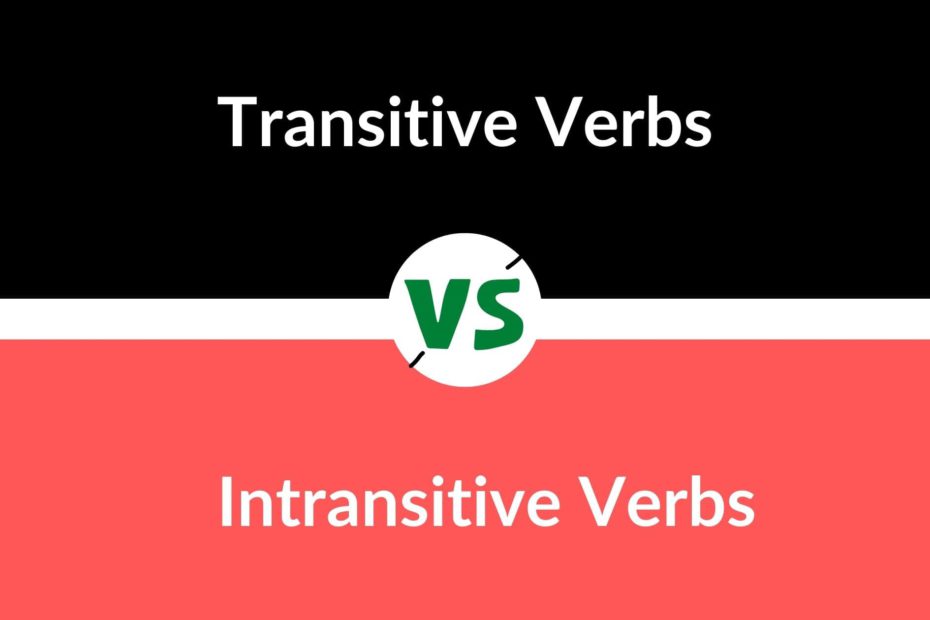When we talk about verbs, we can generally categorize them into two groups: transitive and intransitive. Transitive verbs require an object, while intransitive verbs do not. The difference between transitive and intransitive verbs is not tricky. In this blog post, you will learn everything about transitive and intransitive verbs. So let’s get started.
What are Transitive Verbs?
Transitive verbs are verbs that require an object to complete its meaning. For example, the verb to eat requires an object, such as a piece of bread, to be eaten. In some cases, transitive verbs can be used without an object, such as when we say I am eating.
For example, in this sentence: “Sophia crossed the road.” The transitive verb ‘crossed’ requires an object to act upon like a road. So, the meaning of the sentence directly passes from subject to object.
What if you remove the objects from the above sentences. Then, you are left with an incomplete statement: Sophia crossed. Thus, transitive verbs always needed an object to complete the purpose of the sentence.
How do you identify a transitive verb?
It is easy to identify the transitive verb in the sentence. If you answer the question “Who, what, or which” acted the verb in the sentence? Then the verb will be transitive. For example,
In this sentence: “John William reading the book.” You find that John William is reading the book. So, reading is a transitive verb.
Examples
- Many people watched the movie. ( what they watch: movie)
- You met your brother at school. (Your brother is who you met.)
- Everyone wants more money. (what everyone wants: money)
What are Intransitive Verbs
Intransitive verbs are verbs that do not take a direct object. For example, the verb “to stand” does not involve someone else standing with the speaker. Intransitive verbs are often used to describe actions that do not involve other people or things. For example, the verb “to swim” describes an action that is done by oneself.
Intransitive verbs do not require a subject because they do not have a direct object. They do not require an object to complete their meaning. In short Intransitive verbs can be summarized as verbs that do not require anything to happen iforthem to be completed.
For Example: “I am walking.” This sentence has an intransitive
How do you identify an intransitive verb?
The intransitive verbs are opposite to the transitive verbs. If you do not answer the question “Who, what, or which” acted the verb in the sentence? Then the verb will be intransitive.
Examples:
- You failed.
- John walked with difficulty.
- We will die in the future.
- He ran away.
Some Intransitive verbs include: appear and disappear. Seem: emerge, arise, occur: hope, aspire, die. Expire, live, exist; dive, fall, slide, slip: laugh, smile, rejoice: giggle, smirk, guffaw; amble, linger, loiter, hike, stroll, look, gaze, peer, stare; cease, desist, persist, remain: meditate, which show the intransitive nature of some actions and states.
Transitive vs Intransitive Verbs
In this guide of grammar, as in so many others, the English language is highly flexible. Some intransitive verbs can be changed into transitive verbs: for example, the intransitive verb “look” can be changed into many transitive verbs by adding different adverbs and prepositions.
Phrasal Verbs and Transitivity
Phrases such as down on or up to are added to the verb “look,” for example, looking after or looking into, looking down on, or looking up to.
The term compound verb means a verb that consists of, or is compounded from, two or more words; the alternative term, phrasal verb, means a verb that consists of a phrase, that is, two or more words, rather than a single word.
By adding prepositions or prepositional adverbs to the intransitive verb look, we produce several transitive compound verbs: look after (care for), look at, look back at: look back on (remember), look down on (literally and figuratively to despise), look for. Look forward to, look in on (visit), look into (investigate), look out (items for a jumble sale), look out for (await, beware of), look out on, look over (examine), look through (a lens, or to scan, look to (attend to), lookup (a dictionary or an old friend), look up at, look up to (admire).
Each of these compound verbs is now transitive and must be followed by a direct object to complete its meaning: When his neighbor went into the hospital, John looked after her cat. Children look forward to their next birthday; older men look back on their past.
Summary
There is a big difference between transitive and intransitive verbs. Transitive verbs take a direct object. For example, I give a book to you. The book is the direct object. Intransitive verbs don’t have a direct object. For example, I read a book. The book is not the direct object.
Transitive verbs require a direct object to function. If you don’t have a direct object, the verb doesn’t work. For example, I sing a song by myself doesn’t work because there is no direct object, singer, to which the verb, sing, can be attached.

